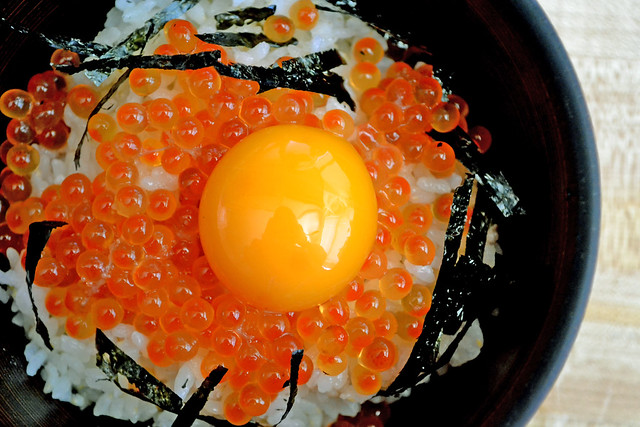
There was an egg festival in my bowl of rice the other day. I placed a raw egg yolk on a mound of
ikura (salmon roe) on top of my steaming hot bowl of rice. The orange hues are sexy and appetizing, glimmering in my bowl.
No matter how many times I have
ikuradon (ikura over rice), I always feel like royalty when it appears in front of me. Honestly, I don't know why ikura has to be so expensive because curing is not very involved. The only thing that I can imagine to be bothersome in the salmon roe curing process is that you have to wait for about half a day for the curing to complete its course. Otherwise, curing
ikura is simple.
This time, I took the advice of Umamimart contributor and Hokkaido native,
Kenji Miura. On my
post about curing ikura, he commented that the Hokkaido way uses salt instead of soy sauce and mirin instead of sake.
I used the following for salt-cured
ikura:
1/2 lb of
sujiko (fresh salmon roe)
6 tbsp of mirin
3 tbsp of sea salt
1 tsp of soy sauce
1/2 inch square
kombu (kelp)
Follow the instructions for separating the ikura on my
previous post. Combine the mirin, salt, soy sauce in a sauce pan and bring to a boil. Let it cool. Add
kombu to mixture.
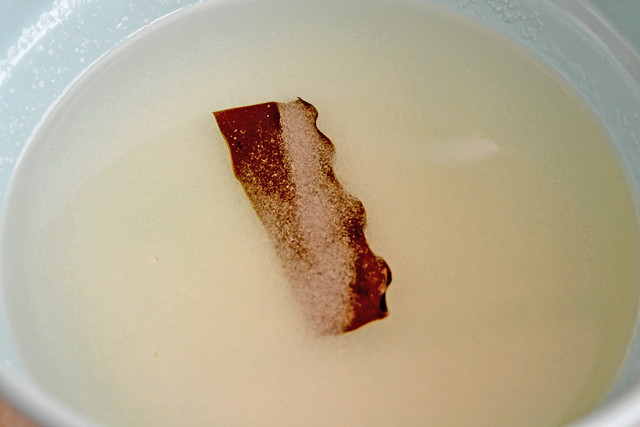
Place separated and rinse
ikura in an air tight container. Pour liquid over the
ikura and seal.
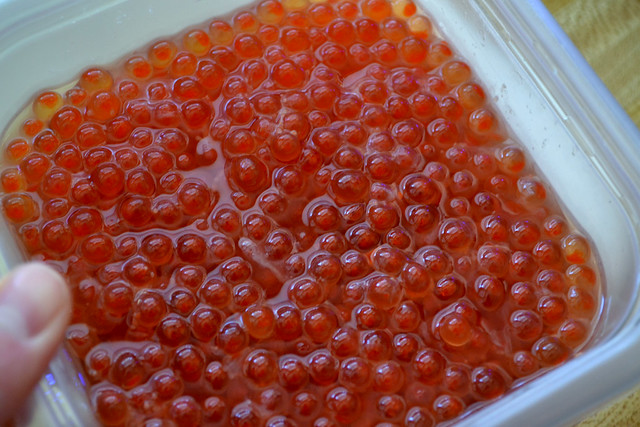
Refrigerate for at least 6 hours and then drain and quickly rinse the ikura. They will last for about 2-3 days in the fridge.
The results were very pleasing. I liked that with the minimal use of soy sauce, the ikura retained their bright topaz-ruby colors while the mirin enhanced the natural sweetness of each bead. Hokkaido-style ikura success!
You may remember from my Hokkaido posts from 2009 that it is the island of
ikura and
soft ice-cream, two favorites of mine. Maybe that's why I tend to get along with people from Hokkaido.
My best friend in Tokyo, Mizuki, is a Hakodate, Hokkaido native.
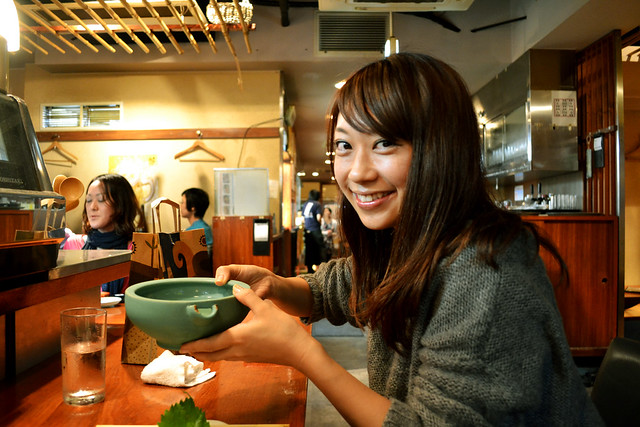 Mizuki with a big bowl of sake.
Mizuki with a big bowl of sake.
Kenji Miura my food mentor and an Umamimart contributor is an Obihiro, Hokkaido native.
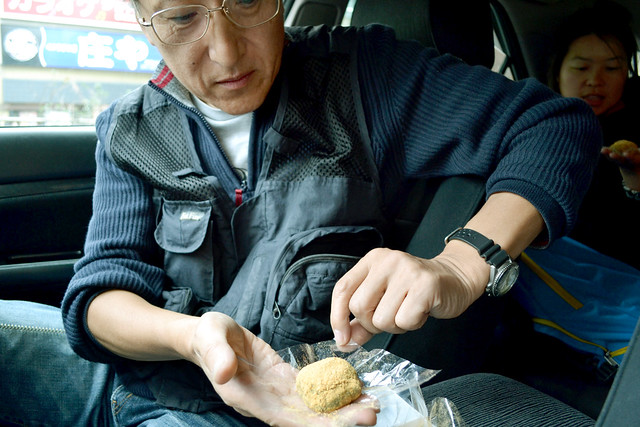 Kenji with warabi-mochi gold.
Kenji with warabi-mochi gold.
These people know how to eat and drink.
Anyway, here's how I made my Egg-festival Rice Bowl.
INGREDIENTS
One serving
2 cups of fresh, hot steamed rice
2-3 tablespoons of salt and mirin cured
ikura
1 egg (from a trusted source i.e. Japanese eggs or farm fresh)
Strands of
nori (seaweed) for garnish
Strands of
shiso (optional)
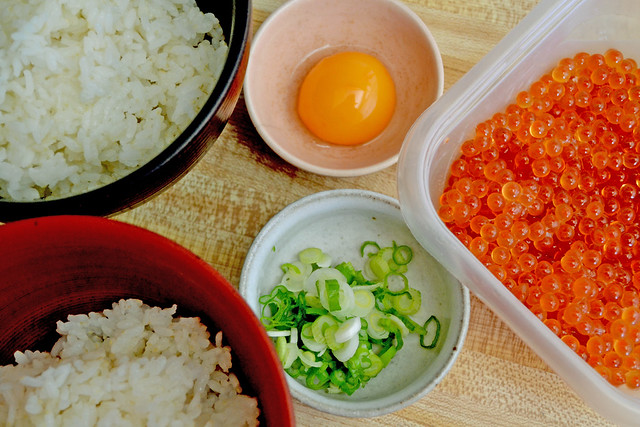 METHOD
METHOD
1. Pour rice into a big
donburi bowl.
2. Carefully compile the
ikura on the rice.
3. Separate the yolk from the eggs. Place the egg on top of the beads of
ikura.
4. Garnish with
nori and
shiso (optional)

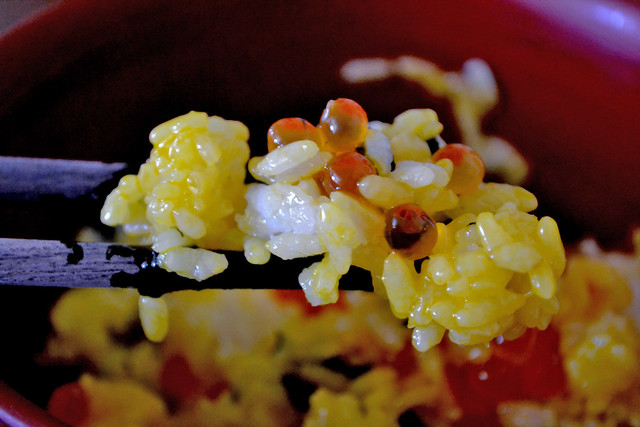
If this doesn't make you scream with glee, I am not sure if we'd get along.
 There was an egg festival in my bowl of rice the other day. I placed a raw egg yolk on a mound of ikura (salmon roe) on top of my steaming hot bowl of rice. The orange hues are sexy and appetizing, glimmering in my bowl.
No matter how many times I have ikuradon (ikura over rice), I always feel like royalty when it appears in front of me. Honestly, I don't know why ikura has to be so expensive because curing is not very involved. The only thing that I can imagine to be bothersome in the salmon roe curing process is that you have to wait for about half a day for the curing to complete its course. Otherwise, curing ikura is simple.
This time, I took the advice of Umamimart contributor and Hokkaido native, Kenji Miura. On my post about curing ikura, he commented that the Hokkaido way uses salt instead of soy sauce and mirin instead of sake.
I used the following for salt-cured ikura:
1/2 lb of sujiko (fresh salmon roe)
6 tbsp of mirin
3 tbsp of sea salt
1 tsp of soy sauce
1/2 inch square kombu (kelp)
Follow the instructions for separating the ikura on my previous post. Combine the mirin, salt, soy sauce in a sauce pan and bring to a boil. Let it cool. Add kombu to mixture.
There was an egg festival in my bowl of rice the other day. I placed a raw egg yolk on a mound of ikura (salmon roe) on top of my steaming hot bowl of rice. The orange hues are sexy and appetizing, glimmering in my bowl.
No matter how many times I have ikuradon (ikura over rice), I always feel like royalty when it appears in front of me. Honestly, I don't know why ikura has to be so expensive because curing is not very involved. The only thing that I can imagine to be bothersome in the salmon roe curing process is that you have to wait for about half a day for the curing to complete its course. Otherwise, curing ikura is simple.
This time, I took the advice of Umamimart contributor and Hokkaido native, Kenji Miura. On my post about curing ikura, he commented that the Hokkaido way uses salt instead of soy sauce and mirin instead of sake.
I used the following for salt-cured ikura:
1/2 lb of sujiko (fresh salmon roe)
6 tbsp of mirin
3 tbsp of sea salt
1 tsp of soy sauce
1/2 inch square kombu (kelp)
Follow the instructions for separating the ikura on my previous post. Combine the mirin, salt, soy sauce in a sauce pan and bring to a boil. Let it cool. Add kombu to mixture.
 Place separated and rinse ikura in an air tight container. Pour liquid over the ikura and seal.
Place separated and rinse ikura in an air tight container. Pour liquid over the ikura and seal.
 Refrigerate for at least 6 hours and then drain and quickly rinse the ikura. They will last for about 2-3 days in the fridge.
The results were very pleasing. I liked that with the minimal use of soy sauce, the ikura retained their bright topaz-ruby colors while the mirin enhanced the natural sweetness of each bead. Hokkaido-style ikura success!
You may remember from my Hokkaido posts from 2009 that it is the island of ikura and soft ice-cream, two favorites of mine. Maybe that's why I tend to get along with people from Hokkaido.
My best friend in Tokyo, Mizuki, is a Hakodate, Hokkaido native.
Refrigerate for at least 6 hours and then drain and quickly rinse the ikura. They will last for about 2-3 days in the fridge.
The results were very pleasing. I liked that with the minimal use of soy sauce, the ikura retained their bright topaz-ruby colors while the mirin enhanced the natural sweetness of each bead. Hokkaido-style ikura success!
You may remember from my Hokkaido posts from 2009 that it is the island of ikura and soft ice-cream, two favorites of mine. Maybe that's why I tend to get along with people from Hokkaido.
My best friend in Tokyo, Mizuki, is a Hakodate, Hokkaido native.
 Mizuki with a big bowl of sake.
Kenji Miura my food mentor and an Umamimart contributor is an Obihiro, Hokkaido native.
Mizuki with a big bowl of sake.
Kenji Miura my food mentor and an Umamimart contributor is an Obihiro, Hokkaido native.
 Kenji with warabi-mochi gold.
These people know how to eat and drink.
Anyway, here's how I made my Egg-festival Rice Bowl.
INGREDIENTS
One serving
2 cups of fresh, hot steamed rice
2-3 tablespoons of salt and mirin cured ikura
1 egg (from a trusted source i.e. Japanese eggs or farm fresh)
Strands of nori (seaweed) for garnish
Strands of shiso (optional)
Kenji with warabi-mochi gold.
These people know how to eat and drink.
Anyway, here's how I made my Egg-festival Rice Bowl.
INGREDIENTS
One serving
2 cups of fresh, hot steamed rice
2-3 tablespoons of salt and mirin cured ikura
1 egg (from a trusted source i.e. Japanese eggs or farm fresh)
Strands of nori (seaweed) for garnish
Strands of shiso (optional)
 METHOD
1. Pour rice into a big donburi bowl.
2. Carefully compile the ikura on the rice.
3. Separate the yolk from the eggs. Place the egg on top of the beads of ikura.
4. Garnish with nori and shiso (optional)
METHOD
1. Pour rice into a big donburi bowl.
2. Carefully compile the ikura on the rice.
3. Separate the yolk from the eggs. Place the egg on top of the beads of ikura.
4. Garnish with nori and shiso (optional)

 If this doesn't make you scream with glee, I am not sure if we'd get along.
If this doesn't make you scream with glee, I am not sure if we'd get along.

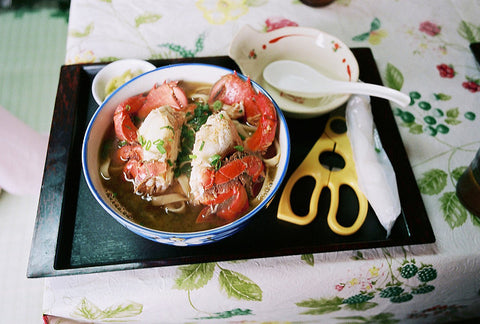


Comments (14)
Droool! I’ll have to make ikura again!
I know you made the shoyu-zuke one and it turned out a little salty. This method is a little less salty because the mirin counteracts it. It’s really good!
Looks delicious! Been wanted to flavor my own ikura but I found it really hard to come by fresh sujiko. I’ve seen them occasionally at Nijiya though.
Yes, don’t give up on your search for sujiko! It’s a fun, satisfying and delicious project.
YUUUUUUM. Give me the recipe for salt-cured sujiko!
Hello. Your photos are exceptional. I don’t even like ikura, but my mouth was watering. Can you tell me what kind of camera you use? I live in Hokkaido, and have recently started photographing the beautiful nature in this area. Thanks, and great writing too.
Thanks John! I use a Nikon D3100. Which part of Hokkaido do you live in? Jealous…
I am living in Sapporo. Now to make you more jealous, I work for a seafood trading company. I work in the Sapporo Seafood Market, and it is very fun. I am working on an ikura report, so your pics were very attractive…thanks again, and yes, I get to take home and eat a lot of off-the-boat seafood caught around Hokkaido. The best was the scallops from Okhotsk, the worst was the raw squid intestines.
Nice photos and write-up! We just cured about 1.2 kilogram of wild salmon eggs here in our home in Arctic Alaska. Love Japanese food! Jack and Barbra Donachy
Hi, I tried your recipe a couple of times and both times a percentage of the eggs came out shriveled and hard like little balls of wax. The first time only about 5% were like this, but the second time about 60% were hard. Any suggestions on how to adjust the recipe?